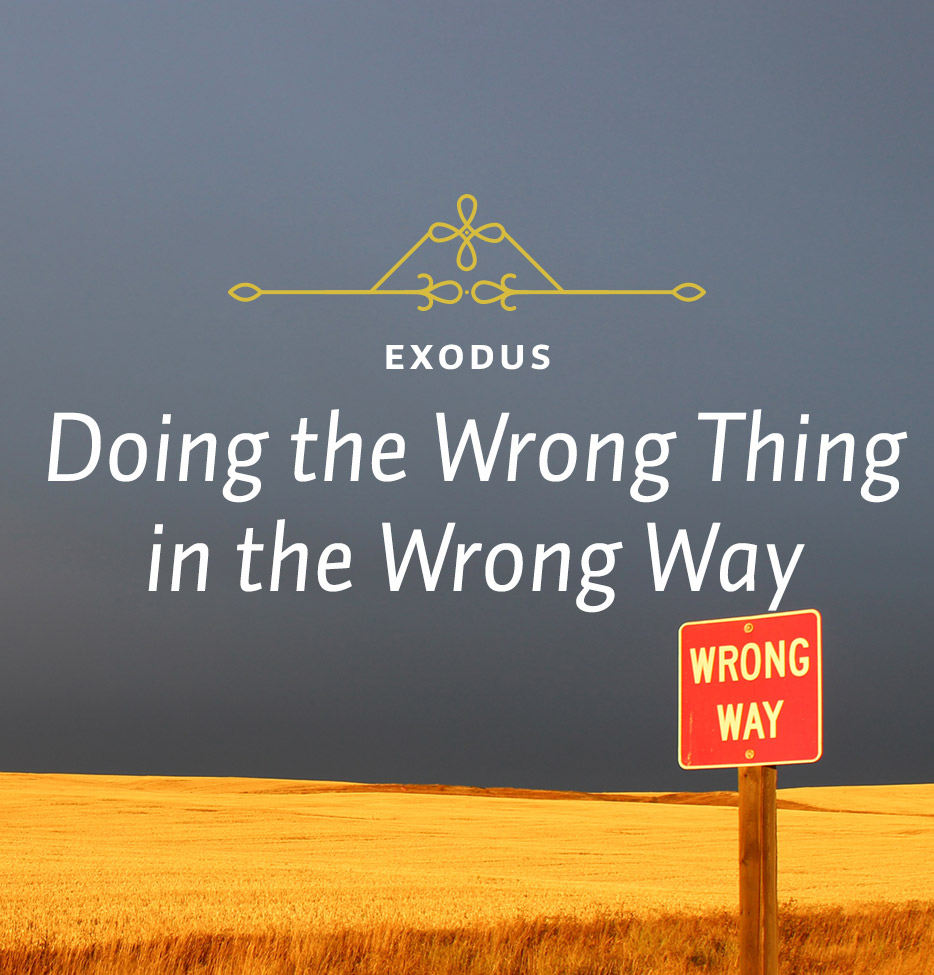We have a tendency, simply because we live in the world and are surrounded by the world’s ideas and ideals, to want to do God’s work in the world’s way, even as Christians. What is the world’s way? Well the world’s way is power, pressure, and money. And so we think that we need to do things that way, too. We need to collect a war chest in order to get our programs through, and we need to get our people elected and put them in positions of government so they can pass laws and force people to do what we think is right. Now there is a place for just laws and they flow from a citizenry who wants to do just things. But the Christian mode of operating is not by money or by power or by politics. Our way of operating is by the Word, teaching it to others, and also by prayer, asking God to bless it. In other words, we don’t advance our cause by killing Egyptians. Moses had to learn that the great revolution that needs to take place is in the hearts and minds of men and women.
People have pointed out the difference between what was happening in France and England in the latter decades of the eighteenth century. The French Revolution was a revolution of power. They drove out the aristocratic rascals and they put their own people in. It was supposed to be the Age of Reason, but it gave birth to the Reign of Terror, which finally led to the tyranny of the Napoleonic era. But in England at about the same time, when England could have fallen into exactly a parallel situation, they had the Wesleyan and Whitefield revivals. As the Word of God had its way in the hearts of thousands and thousands of people, you had a moral transformation of the land, which eventually expressed itself in its laws and in culture. That kind of renewal does not happen in the world’s way.
What happened when Moses tried to bring about change in the world’s way? First of all, even his own people rejected him. After killing the Egyptian, he hid the body and he thought nobody saw it. But when he came back the next day and he tried to settle a dispute between two Hebrews, the one who was in the wrong said to Moses, “Are going to kill me, just as you killed the Egyptian?” When what Moses had done became known, he knew it wasn’t safe. We’re told that the pharaoh was about to kill him, which made Moses flee from the land. It was only after he had spent the next forty years, another four decades, in the desert of Midian, that God came to him again and gave him the call that brought him to Pharaoh and enabled him to lead the people out of Egypt.
What did Moses learn from this? The first thing he learned is something we hear from the words of Jesus, who said in John 15:5, “Without me you can do nothing.” No matter how talented we think ourselves to be, no matter how great our training has been, no matter how much success we have had in our profession, or no matter how noble our cause, unless Jesus Christ is actually working in us spiritually, we are unable to accomplish anything at all.
We don’t think that way. We hear Jesus’ words in John 15:5 and that it merely means that without Christ we cannot do very much. Thus, if we are trying to do something, we think that if we just put enough energy into it, we can make it happen. But you see, Jesus said, “Without me you can do nothing.” Here was Moses educated in all the wisdom of the Egyptians. And yet he failed utterly. If we think we can do it on our own, or even partially on our own, God is going to allow us to fail in order that we might learn as the Lord spoke through Zechariah, “It is not by might, nor by power, but by my Spirit”—the Spirit of the Lord.
The second lesson is the wrong decisions we will make if we go our own way instead of God’s way. Look what terrible things result! Moses started out with a noble purpose, and yet the first thing he does is murder an Egyptian. There is nothing that any Christian before us has done that you and I are not capable of doing if we’re going in our way rather than in the way of God. David knew this about himself, which is why he prayed in Psalm 19:13, “Keep your servant also from willful sins, may they not rule over me.”
The third lesson is that God is able to work in us in spite of our failures. We need this encouragement. God will work with us again. Now sometimes it takes a long while. It was forty years before God came to Moses to call him to lead the people. But at the end of the forty years, God did come and He did call him and He sent him. Moses, now obeying God, was successful. You see, it was just like Jonah. Jonah ran away from God, but after he had been spit up again on the beach by the great fish, it says the word of the Lord came to him a second time.






